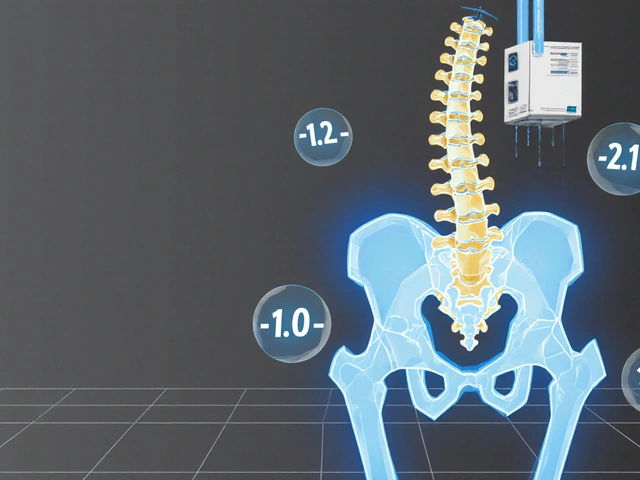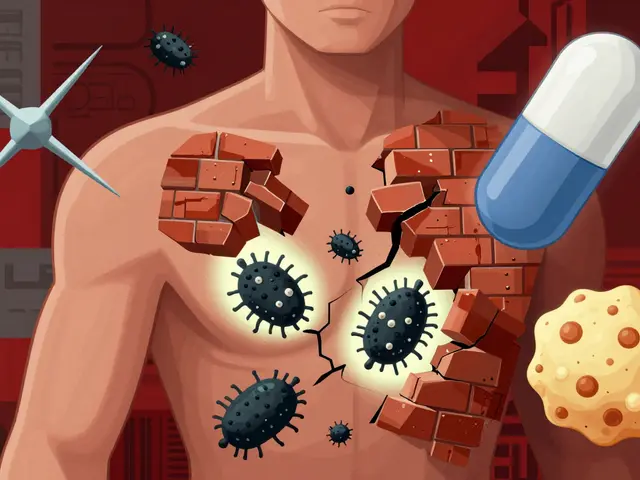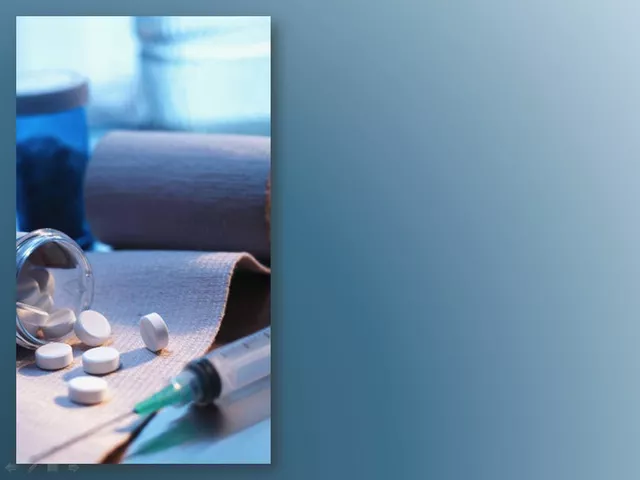If you’ve ever wondered if there’s a pill that actually helps people stop drinking, you’re not alone. Acamprosate isn't a miracle fix, but it’s made a real difference for thousands dealing with alcohol dependence. It doesn’t get nearly the hype that rehab centers or therapy do, yet, for folks looking to stay sober, acamprosate can quietly change the game. Let’s pull back the curtain—see how it works, what it feels like, and what the research really says.
Understanding Acamprosate: What It Is and How It Works
Most people haven’t even heard of acamprosate, unless they or someone they know has been through a serious struggle with alcohol. Approved by the FDA in 2004, acamprosate goes by the brand name Campral. Unlike some medicines that make you sick if you drink alcohol (like disulfiram), acamprosate isn’t meant to punish you into sobriety. Instead, it tackles the chemistry in your brain—especially the stuff that goes haywire during recovery.
So, what’s going on up there? Alcohol messes with neurotransmitters, especially GABA and glutamate. Regular heavy drinking throws your brain’s balance out of whack, making you feel anxious, jittery, or downright miserable if you suddenly stop. Acamprosate tries to fix that imbalance. It calms the excited signals and ups the soothing ones—helping with those relentless cravings that drag people back to the bottle.
Doctors usually prescribe acamprosate once someone has already quit drinking. It’s not used to treat withdrawal, but rather to help keep folks from relapsing. You take it as tablets (with water), usually three times a day—not the most convenient, but that’s the accepted dose. And an interesting detail: acamprosate isn’t metabolized in the liver, so people with liver problems from heavy drinking can often still use it.
What to Expect: Real World Experience with Acamprosate
Let’s be real: if you’re expecting acamprosate to flick a switch in your brain and make all your cravings vanish, you’ll be disappointed. What it does is quieter but powerful. It takes about a week or two to start working fully, sometimes longer. People report feeling steadier—less on edge, less distracted by gnawing urges to drink.
Side effects? Usually pretty mild if they happen at all. The most common ones are diarrhea, stomach upset, and maybe some itching or a weird tingling feeling. For most, these fade after a couple weeks. Very rarely, people have allergic reactions or notice kidney problems, so your doctor will probably ask you about your medical history and might check your kidneys before you start. Acamprosate doesn’t really interact much with other medicines since it’s handled by your kidneys—not your liver.
If you’re thinking about trying it, you should know the evidence is encouraging but mixed. The big reviews and meta-analyses show that acamprosate gently nudges the odds in favor of recovery. According to a 2023 Cochrane Review, people using acamprosate are about 30% more likely to stay sober for at least a few months, compared to those taking a placebo. That’s not a magic bullet, but it’s real, especially when combined with therapy and support groups.

Acamprosate in the Big Picture: Recovery, Myths, and Facts
It’s tempting to look for an easy way out—one magic remedy to whisk cravings away. That’s just not how recovery works. Acamprosate fits into a bigger landscape. It’s part of what doctors call "medication-assisted treatment." Used alongside counseling, group support, practical life changes—it helps tip the odds toward long-term sobriety. It doesn’t make you stop wanting to drink, but it softens the edges, makes it easier to stick with your decision.
Myth time: Some folks think acamprosate means you don’t have to put in the work. Nope. Recovery is still about showing up, talking things out, building new habits. Acamprosate is just one tool, not the whole toolbox. And a heads-up: it doesn’t work if you’re still drinking. You have to be sober before starting—it’s not a detox medication. In fact, if you’re still feeling withdrawal shakes or getting night sweats, you need something else at first.
Curious about how often it actually helps? Here’s a quick look at the numbers reported in a 2023 review:
| Key Outcome | Placebo Group | Acamprosate Group |
|---|---|---|
| Percent Sobriety at 6 Months | 23% | 30% |
| Relapse Rate within 12 weeks | 72% | 60% |
| Reported Side Effects | 17% | 19% |
Studies say the effect is small but meaningful—especially for people who have tried and failed to quit drinking several times before.
Tips for Sticking With Acamprosate Therapy
Anyone who’s ever tried taking a medication multiple times a day knows how easy it is to miss doses. That’s one of the quirks with acamprosate: three times a day can be tricky. Tips that actually help? Set reminders on your phone, tie your doses to meals, and keep a pill organizer around. Tell someone close what you’re trying to do—honesty helps with accountability.
It also helps to keep expectations in check. Don’t get discouraged if you don’t feel noticeably different in the first week. Acamprosate works in the background, smoothing out the day-to-day struggle. If you miss a dose, just take it as soon as you remember—skip it if it’s almost time for the next. Don’t double up to "catch up." And never just stop taking it without talking to your doctor; that can mess with your momentum.
People often ask, “How long do I have to take this stuff?” Doctors differ on this, but most suggest at least 6-12 months. Some stick with it longer, especially if cravings return after stopping. If you start noticing bothersome side effects or have issues with your kidneys, check in sooner. And yes, you can usually take acamprosate with other addiction meds if needed—naltrexone, for example—but always under a doctor’s care.
- Track your doses and symptoms in a notebook or an app
- Reach out when you’re struggling—acaprosate isn’t a substitute for people in your corner
- Use support groups—many find AA or online communities boost their odds
- Stay hydrated—simple but helpful with potential mild stomach issues

Looking Forward: The Future of Acamprosate and Alcohol Treatment
Back in the ’80s and ’90s, doctors mostly had counseling and shaming scare tactics. Now, with meds like acamprosate, the outlook for recovery has changed. While it’s not a headline grabber, it’s a quiet champion for folks done with the rollercoaster of drinking. Researchers are now digging into ways to make acamprosate more effective—maybe combining it with other medications or customizing treatment to someone’s DNA.
But here’s the main takeaway: this isn’t just a pill against cravings; it’s proof that science can help. If you—or someone you care about—is sick of broken promises, acamprosate offers a shot at something better. Sure, it requires patience and a willingness to stick it out, but it won’t mess with your liver and it gives people a scaffolding when their brain chemistry feels stacked against them.
Insurance usually covers it, since it’s been generic for a while. As stigma fades, more doctors are finally talking about it as a standard of care, not a secret last resort. If you want a life where alcohol doesn’t call the shots, ask your doctor about acamprosate. It might not be fancy, but sometimes steady and reliable beats the spotlight.








Edward Glasscote August 4, 2025
Just a heads‑up, acamprosate isn’t a magic pill, it’s more of a background helper. It can smooth out cravings once you’re already clean, but you still need to stick to the plan.
Gaurav Joshi August 10, 2025
Most people overhype meds like this and ignore the real work.
Jennifer Castaneda August 16, 2025
There’s a hidden agenda behind the push for acamprosate that most doctors won’t talk about. The pharmaceutical lobby banks on patients buying a lifelong prescription while the side‑effects are downplayed. Even the FDA’s briefing notes mention rare kidney issues that get buried in the fine print. If you’re looking for a clean break, you might want to double‑check the data yourself.
Annie Eun August 22, 2025
Imagine finally finding a tool that actually eases that gnawing itch for a drink. That’s what acamprosate promises – a calm in the storm of withdrawal. It doesn’t erase the desire but dulls the edge, giving you room to breathe. Pair it with therapy and you’ve got a solid reboot for the brain. It feels like slowly turning down the volume on a blaring speaker.
Jay Kay August 27, 2025
It’s absorbed by the kidneys so liver‑damage patients can use it safely. The three‑times‑daily schedule is the only hassle.
Franco WR September 2, 2025
I’ve watched dozens of friends wrestle with the roller‑coaster of alcohol dependence, and the frustration of feeling powerless is all too real.
When they first heard about acamprosate, the hope was palpable, like a light at the end of a tunnel that had seemed endless.
What they often don’t realize is that the medication is not a switch but a gradual stabilizer for the brain’s chemistry. By modulating the glutamate and GABA systems, it helps quiet the hyper‑active circuits that scream for a drink. The first week can feel like nothing changed, and that’s why patience is essential. Around day ten, many start noticing they’re less jittery during moments that used to trigger a craving. Sleep improves, and the mental fog that followed heavy drinking begins to lift. Side‑effects are usually mild – a bit of stomach upset or occasional tingling, which tends to fade as the body adjusts. If something feels off, a quick check of kidney function with your doctor is a smart move, since the drug is cleared renally. I’ve also seen that coupling the pill with regular support meetings amplifies the benefit, because the social accountability fills the gaps medication can’t. People who skip doses often notice a slip in their steadiness, reminding them why consistency matters. Setting alarms on a phone, linking the dose to meals, or using a pill organizer are simple tricks that keep the regimen on track. The cost can be a barrier, but most insurance plans cover it now that it’s generic, and many clinics have patient‑assistance programs. Remember that the medication is meant for those who have already stopped drinking; it won’t work as a detox tool. If you’re still feeling withdrawal symptoms, address those first with appropriate care. Overall, acamprosate is a quiet champion – not a headline act, but a steady partner in the long marathon of recovery. 👍💪
Rachelle Dodge September 8, 2025
Think of the brain as a garden; acamprosate waters the roots that have been starved by booze. It gives the stubborn weeds a chance to wilt.
Gaurav Joshi September 14, 2025
A practical tip many overlook is syncing the medication schedule with daily rituals, like breakfast, lunch, and dinner. This alignment reduces missed doses and builds a habit loop. Consistency often translates to steadier progress.
Elaine Proffitt September 19, 2025
I was skeptical about a pill doing anything but it actually helped my anxiety level drop a lot
Christopher Munt September 25, 2025
Acamprosate really smoothed out the cravings for me 😊 It’s not a cure but it’s definitely a boost.
Mike Creighton October 1, 2025
In the theater of addiction, the protagonist rarely walks the stage alone. Acamprosate steps in as a subtle understudy, whispering confidence when the applause fades. It does not rewrite the script, but it prevents a sudden blackout. The mind, once illuminated, can finally rehearse a new act.
Desiree Young October 6, 2025
Don’t expect miracles the moment you pop the first pill. Stick with it and you’ll see the edge dull.
Vivek Koul October 12, 2025
One must acknowledge that the pharmacological modulation of glutamatergic transmission constitutes a noteworthy advancement in the domain of addiction therapeutics. The empirical evidence, whilst modest, substantiates a statistically significant augmentation in abstinence rates. Consequently, clinicians are advised to incorporate acamprosate within a comprehensive, multimodal treatment regimen.
Frank Reed October 18, 2025
Hey, kudos for looking into options – taking that first step is huge. Keep a diary of how you feel each day, it really helps to see the subtle shifts. And remember, you’ve got a whole crew behind you cheering you on.
Bailee Swenson October 24, 2025
If you’re still chasing the high, stop wasting time – acamprosate is for the serious who want results! 🚀💥
tony ferreres October 29, 2025
The journey to sobriety is a collective climb; nobody reaches the summit alone. Acamprosate can be the harness that steadies your grip, but you still have to keep moving upward. Let’s lift each other up and push past the limits together! 🌟
Kaustubh Panat November 4, 2025
Only the discerning mind appreciates the nuanced interplay of neurochemistry that acamprosate exploits. The masses cling to outdated abstinence myths while the elite embrace scientific adjuncts. Embrace the sophistication of a calibrated pharmacological aid.
Arjun Premnath November 10, 2025
I’ve seen participants who thought they’d never stay sober bloom after adding acamprosate to their toolbox. The confidence boost is real, and it fuels their commitment to therapy. Keep the hope alive and the progress will follow.
Johnny X-Ray November 15, 2025
Picture waking up without that relentless urge gnawing at you – that’s the subtle miracle acamprosate can deliver. It’s not a blockbuster, but it’s a steady drumbeat that keeps you marching forward. Pair it with a supportive community and you’ll feel unstoppable. 🌈✨
tabatha rohn November 21, 2025
Stop debating and start acting – the pill works if you give it a chance! 😤🔥